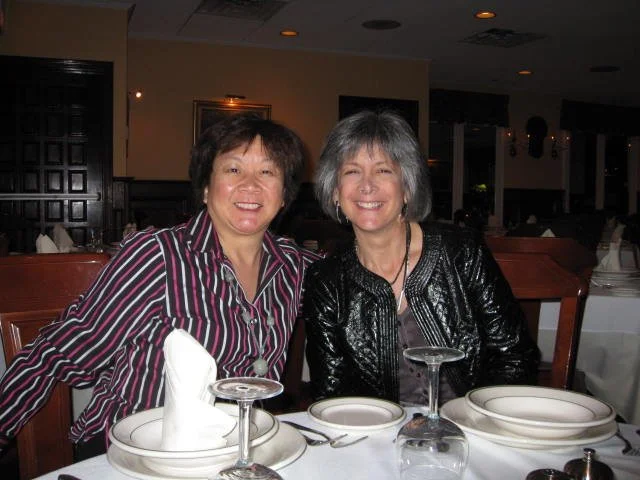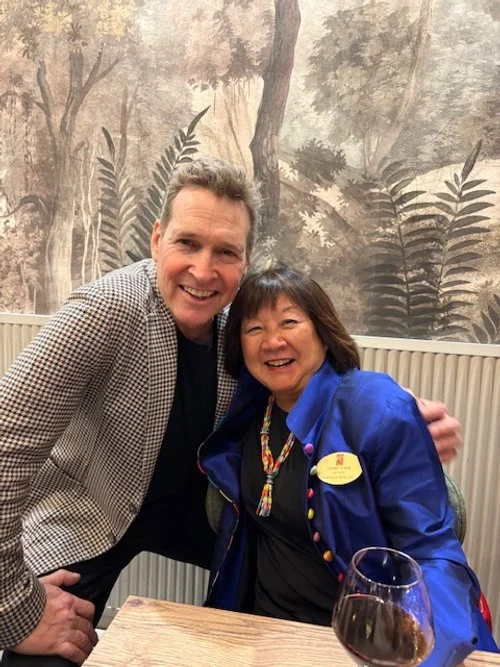Top Ten Takeaways From My Cannes Experience
1. Start Early. Then Start Even Earlier than That
Planning ahead is everything. I locked in our Airbnb by November, 2024 and scored great airfare prices by January, 2025 —long before 35,000 people began to descend on Cannes and prices soared. Once registration opens in early February, the options for affordable, walkable housing near the Palais (the central part of the Festival) become scarce.
If you're staying for the full two weeks (like we did), an apartment is ideal. While Airbnbs are cheaper in towns/villages adjacent to the main Cannes footprint, it is best to find something within walking distance of the Palais.
Ours was in the charming Pointe Croisette neighborhood—a 20-minute stroll to the Festival along the Boulevard de la Croisette, hugging the Mediterranean. It gave us space to decompress and experience a taste of the local neighborhood.
As someone new to the film world, I started researching how to get accredited last October. Even then, the accreditation process threw curveballs my way because I did not know how to produce my appropriate/complete film credentials. I finally figured it out, with huge thanks to Tony Shyu/Himalaya Entertainment. I received my badge on March 15, but I still needed to get Holly Ward (my indispensable partner on this project) accredited. There was no way that I was going to Cannes without her. After many rounds of urgent emails and paperwork edits flying between my home and the accreditation office in Cannes, we finally got her approved by April 3, just six weeks before the start of Cannes.
Lesson learned: Buff up your film bio and website, get your IMDb Pro page in order, and affiliate with a production company that Cannes recognizes. This is what took up so much of my time. Stock up on the Maalox (this accreditation process was the most stressful part of my entire Cannes experience). Expect delays. Stay persistent, yet be polite with the Cannes registration staff.
I was able to converse ever so primatively in French with Anthony from the accreditation office (see #8 below). I believe that made a difference in softening the edges of frustrating conversations and misunderstandings via email and phone.
2. Learn the Logistics. They’re Complicated for a First-Timer and some things may have changed since the Pandemic
Cannes isn’t just a festival—it’s a maze of overlapping platforms and credentials. There’s the official Festival de Cannes, the Marché du Film, the American Pavilion (AMPAV), and Cinando (the professional networking database). I’m sure there are more, but these were all that my newbie brain could handle. Each has a different function, login, and set of opportunities.
Plan to build your schedule before you arrive. Prepare for an onslaught of emails. The learning curve is steep for first-timers, but the effort pays off.
3. Pitch Practice is Non-Negotiable
Once you are accredited and registered, Stage32.com contacts you to offer on-line education and networking opportunities. Thanks to Stage32.com, I was able to practice two six-minute pitch sessions with two different film executives. Their feedback sharpened how I talked about Dancing in Their Light at Cannes. That training gave me confidence and clarity—and I still use Stage32 for workshops, networking, and continued learning opportunities today.
4. Know the Geography and No Nudity!
Cannes is very much a walking city—especially once the Festival begins, security tightens, and shuttle buses are no longer allowed near the Palais. Uber was reliable throughout our stay; taxis, not so much. Arriving a day before the Festival’s opening turned out to be a smart move. It gave us time to explore the grounds, get our bearings, and ease into the flow before the crowds and heightened security descended. I would definitely do that again.
The dress code is conservative and respectful. This year, the Festival introduced stricter dress code rules, explicitly banning “naked dressing” and “voluminous outfits” like gowns with large trains, according to the official website. The decision—announced prior to the event—was intended to address both decency and the practical challenges such attire creates on the red carpet.
For me, and since I wasn’t walking on the red carpet for a premiere (yet!), business casual worked for about 90% of the events we attended. And yes—comfortable shoes are an absolute must.
5. The American Pavilion Is Worth It
Investing in the higher level (Red Carpet) Membership at the American Pavilion gave us a home base - with concierge service - right in the center of the Cannes activities. It was our landing pad for networking, inspiration, and catapulted us into some of our most exciting, unexpected connections.
6. Stay for Both Weeks for an Immersive Experience
Some folks left after the first week—but I’m so glad we stayed for the entire duration. Film access gets easier after the press and celebrities leave, and our Marché badge often got us in to screenings before the general public. If you are going to fly half way across the world, use the second week to settle in and build on the relationships made during Week One. Everyone seemed to be more relaxed in the second week. Next time, I’ll plan to schedule more meetings during Week 2 and do some day trips, after all: Monte Carlo is on my bucket list!
7. Meetings = Strategy + Hustle
Executive meetings are fast-paced. Most gave me 20 minutes; one gave me a luxurious hour. I prepped hard, scheduled four key meetings in advance, and each one expanded my network.
Big tip: get invited to the after-parties. That’s where deals are whispered over cocktails, and where you might just meet your next collaborator or investor. I missed those opportunities this time—but next time, I’ll aim for some all-nighters and maybe hit that casino by the Palais!
8. French Helped Me Connect
I heard that most locals appreciate your efforts to attempt to speak their language even if you stumble along, so starting last December, I brushed up on my high school French (thank you to my weekly Babbel and Duolingo lessons!). It certainly helped with my accreditation process, as mentioned above. Ordering at cafes, attempting to chat with locals, and immersing in the rhythm of everyday French life added a joyful layer to the whole experience. “Une coupe de champagne, s’il vous plaît” and “où sont les toilettes?”smoothly rolled off my lips by the time I got to France.
9. The Film Industry Embraced Our Story
I learned that there is sincere curiosity and interest in Dancing in Their Light. People responded with warmth, encouragement, and offers to connect me to new relationships. Executives, creatives, distributors—I felt genuinely welcomed by all. Talk about Radical Hospitality! Since coming home, I’ve added more than 50 new colleagues…and counting… to my creative networks. The momentum is real. The possibilities? Even more so. There is much to build on now.
10. Build And Tighten Your Circle of Trust (aka: Team Debbie)
The first thing that I did when I decided to go to Cannes: I started listening. I tapped into my networks, reaching out to anyone I knew (and people they knew) who had been to Cannes. Every conversation offered a nugget of gold—it became a kind of unofficial Cannes masterclass—and I took lots and lots of notes.
At the heart of this journey was my trusted mentor and longtime friend, Lee Kappelman. A seasoned artists’ representative and former Hollywood agent, Lee has held senior executive roles at CBS Television and King World Entertainment, and once navigated the literary landscapes of both Los Angeles and New York with rare precision and insight.
It was Lee who, within months of my book’s release in 2022, immediately recognized the cinematic potential of Dancing in Their Light—long before I fully saw it myself. We started charting a path to move Dancing in Their Light from the page to the screen in 2023 and I think she cheered the loudest when I declared that I was ready to go to Cannes.
She has prepared me mentally, emotionally, and spiritually as I stepped into the Cannes world. She has been my guide through turning points throughout my career, offering invaluable wisdom. And post-Cannes, her role has only deepened.
Lee is cheering me even more loudly as she helps me interpret the conversations, connections, and opportunities that emerged. She continues to lead and shape the evolving strategy for where Dancing in Their Light goes from here. She’s “all in”, she’s my fiercest protector, and a charter member of Team Debbie!
My lawyer, Steven Beer, threw me into the deep end of the Cannes pool—and stayed close by as a calm, protective presence. That kind of grounding support is priceless in an industry that moves fast and expects you to keep afloat.
Steven has been instrumental in supporting the early careers of major artists, including Britney Spears, Lady Gaga, and Taylor Swift. I’d like to think I’m in pretty good company under Steven’s watchful eye and steady tutelage!
Cannes can be dazzling, overwhelming, and occasionally surreal. Having a trusted creative partner by your side—someone who knows you, knows the project, and can keep you grounded—is invaluable. Enter Holly Ward: Associate Producer, steady hand, and the one who reminded me to breathe (and occasionally, to have une bouteille de champagne).
Holly wrote the very first draft synopsis for Dancing in Their Light—the version that lit the spark and got my creative engines going. She has an uncanny artistic gift and a sharp editing eye which is of tremendous help as we create a sizzle reel and a 10-minute trailer in partnership with Tony Shyu. And truth be told, she can pitch the project better than I can. Going one step further — at a meeting with my lawyer, Steven told Holly, “you make Debbie better”. And that is true.
A mentor told me: “Go to Cannes with someone who can keep you steady and focused—and who can have as much fun as you do.” Holly was all that and more. She was my wingwoman, my compass, my friend, and when the pressure spiked, my human defibrillator. I’m grateful she said “oui” to the journey!












